Northern Ireland profile
- Published
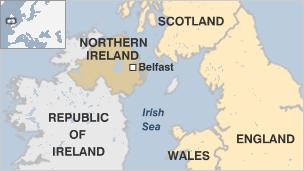
Northern Ireland, a part of the United Kingdom, is emerging from a period of conflict known as "the Troubles" and is attempting to implement an historic peace deal.
Security has returned - though not without occasional reminders of the bad old days - and Northern Ireland has begun to reap the economic and social benefits.
But divisions persist, finding physical form in the barriers that separate some communities. Preferences in schooling, sport and culture often follow ethnic and religious fault lines.
Northern Ireland is made up of six counties and forms part of the province of Ulster. Most of its people belong to one of two communities: the mostly-Protestant descendants of Scottish and English settlers and a mainly Catholic community.
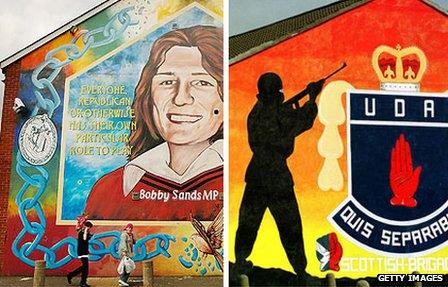
Giant murals became one of the main symbols of Northern Ireland's divisions
Religious and cultural traditions meld with politics. Unionists - who are mostly Protestant - want Northern Ireland to remain part of the UK. Nationalists - who are mostly Roman Catholic - have traditionally favoured union with the Irish Republic.
Though a part of the UK, Northern Ireland manages many of its affairs along its own lines, including the education system and abortion legislation.
Roots of conflict
The political entity of Northern Ireland was created by the 1920 Government of Ireland Act, which granted home rule but left six counties in the north as a part of the UK. The mainly-unionist population there had opposed being included in a home rule settlement.
A unionist-dominated Northern Ireland parliament opened in Belfast in 1921. The ensuing decades saw systematic social discrimination against the Catholic and nationalist minorities.
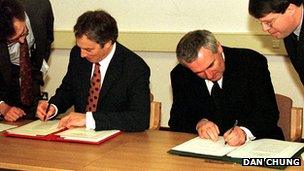
The Good Friday Agreement of 1998 paved the way for devolution and power-sharing
In the late 1960s, as the Catholic community stepped up a campaign for equal rights, the perception grew among some unionists that the Protestant dominance of Northern Ireland was under threat. Tension spilled over into violence and the British government ordered troops onto the streets in 1969.
As the situation escalated, the British government imposed direct rule in 1972. Paramilitary groups, both republican and loyalist, became increasingly deadly. The bombings, shootings and sectarian brutality of Northern Ireland's Troubles were to last for decades. Over 3,600 people, most of them civilians, died. The violence spread to the British mainland.
Road to peace
The landmark 1985 Anglo-Irish Agreement gave Dublin a voice in the debate about Northern Ireland. By the early 1990s London and Dublin had resolved to initiate multi-party talks. Paramilitary ceasefires and months of gruelling bargaining culminated in the 1998 Good Friday Agreement.
The deal addressed differences over national identities in Northern Ireland, as well as the relationship with Dublin, which gave up its constitutional claim to Northern Ireland.
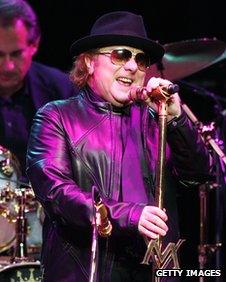
Famous cultural export: Singer Van Morrison
It set up a power-sharing mechanism and restored devolved government through the Northern Ireland Assembly. Voters in Northern Ireland and the Republic backed the deal in referendums.
But implementation of the agreement has been tortuous. The assembly was suspended in 2002 amid a row over alleged activities of the Irish Republican Army, the IRA.
In a bid to restart the political process and after consultations with Dublin, London passed emergency legislation in spring 2006 enabling the recall of the assembly in May of that year.
But assembly leaders missed a November 2006 deadline to form a power-sharing executive. Assembly elections in the following March led to the eventual swearing-in of the leaders of the power-sharing government on 8 May 2007, ending five years of direct rule from London.
Hopes of a permanent end to violence were raised in summer 2005 when the IRA formally announced an end to its armed campaign. Soon afterwards the arms decommissioning body said it was satisfied that the IRA had put its weapons beyond use.
However, dissident republican groups such as the Real IRA and Continuity IRA still represent a threat to the peace process. The killings of two soldiers and a policeman by dissident republican factions in March 2009 raised fears that such paramilitary groups still had the capacity to undermine the achievements of the Good Friday Agreement.
The Northern Ireland tourist industry has already begun to reap the benefits of the increased peace and stability that followed the implementation of the power-sharing agreement. For its growing number of visitors, Northern Ireland offers lakes, mountains and a rugged coast that includes the basalt columns of the famous Giant's Causeway and miles of sandy beaches.
Its cultural contribution includes the poetry of Seamus Heaney, much of it evoking local life, and the music of Belfast-born musician and songwriter Van Morrison.
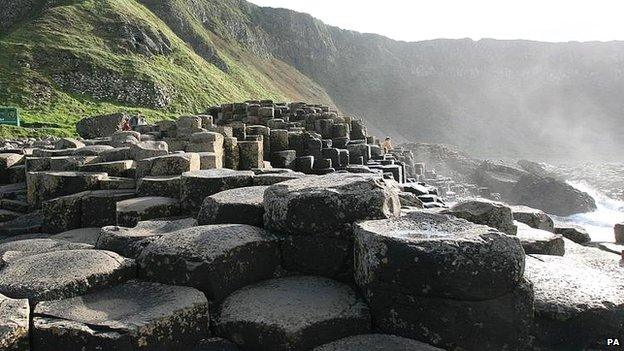
The 40,000 naturally formed basalt columns of Giant's Causeway are a World Heritage Site